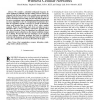Free Online Productivity Tools
i2Speak
i2Symbol
i2OCR
iTex2Img
iWeb2Print
iWeb2Shot
i2Type
iPdf2Split
iPdf2Merge
i2Bopomofo
i2Arabic
i2Style
i2Image
i2PDF
iLatex2Rtf
Sci2ools
161
click to vote
TON
2010
2010
Fast Algorithms for Resource Allocation in Wireless Cellular Networks
Abstract--We consider a scheduled orthogonal frequency division multiplexed (OFDM) wireless cellular network where the channels from the base-station to the mobile users undergo flat fading. Spectral resources are to be divided among the users in order to maximize total user utility. We show that this problem can be cast as a nonlinear convex optimization problem, and describe an ( ) algorithm to solve it. Computational experiments show that the algorithm typically converges in around 25 iterations, where each iteration has a cost that is ( ), with a modest constant. When the algorithm starts from an initial resource allocation that is close to optimal, convergence typically takes even fewer iterations. Thus, the algorithm can efficiently track the optimal resource allocation as the channel conditions change due to fading. We also show how our techniques can be extended to solve resource allocation problems that arise in wideband networks with frequency selective fading and when the ut...
Related Content
| Added | 22 May 2011 |
| Updated | 22 May 2011 |
| Type | Journal |
| Year | 2010 |
| Where | TON |
| Authors | Ritesh Madan, Stephen P. Boyd, Sanjay Lall |
Comments (0)

